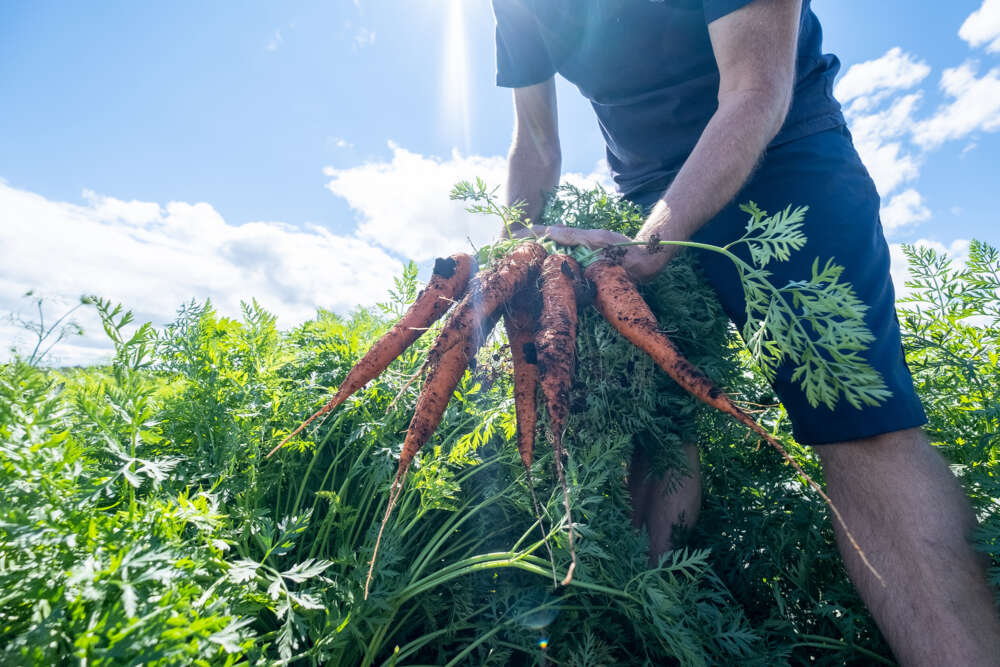This publication is available in French here. Cette publication est disponible en francais ici.
A new network led by the University of Guelph, in collaboration with key national partners, will create an agri-food innovation and entrepreneurship training platform that aims to make Canada the global leader in developing agri-food innovation.
The University has received a Lab to Market grant for nearly $16.3 million over five years to support Sustainable Food Systems for Canada (SF4C) – a platform designed to develop skills and offer entrepreneurial education, equipping the agri-food ecosystem with the tools required to move new innovations from university lab-based prototypes to fully commercialized technologies.
Lab to Market grants support post-secondary institutions and their affiliates in creating and sustaining networks dedicated to developing and delivering entrepreneurial skills training.
This funding was announced today by Terry Duguid, Minister of Sport and Minister responsible for Prairies Economic Development Canada on behalf of Minister of Innovation, Science and Industry François-Philippe Champagne.
U of G leading mobilization of food system resources nationally
Dr. Rene Van Acker, interim president and vice-chancellor says, “The goal of SF4C is to build Canada’s first ever nationally networked entrepreneurial platform to connect Canadian agri-food researchers and innovators with industry, government, and communities. Through training, mentorship, and networking, SF4C ensures a continuous pipeline of talent to drive Canada’s economic security and productivity in a changing world.”
SF4C will have two national co-chairs, Dr. Evan Fraser, professor in the Department of Geography, Environment & Geomatics, College of Social and Applied Human Sciences (CSAHS) and director of the Arrell Food Institute, and Dr. Lenore Newman, professor and director of the Food and Agriculture Institute at the University of the Fraser Valley.

Together, they will bring together experts from agriculture, veterinary medicine, Indigenous organizations and startups to support programs across Canada and form one of the world’s largest food system innovation training networks focused on agri-food.
“Current methods of food production are insufficient to meet increasing global demand and to mitigate the effects of climate change,” says Fraser. “Moreover, innovation is not a subset of the agricultural sector; it is a requirement for modern growers, producers, and processors. At the heart of SF4C is a philosophy to nurture business-minded research and develop a Canadian base of educated innovators who will bring as many solutions as possible to the market.”
Newman adds, “As we face a changing climate and challenging global political situations, it is more important than ever to grow our domestic food system. SF4C is a national step forward in agricultural innovation.”
Dr. Shayan Sharif, interim vice president, research and innovation, says, “This funding is a testament to the University of Guelph’s expertise in catalyzing partnerships within and beyond this critical sector of interest. SF4C is bringing together top agri-food institutes who are already delivering an ambitious suite of innovation programs, creating a unified voice that will stimulate Canadian agri-food innovation and promote economic and environmental sustainability.”
Leveraging the power of networking, mentorship and experiential learning
Three programs will be developed under the initiative’s larger umbrella: 1) a training platform, 2) a mentorship and concierge service designed to connect innovators with additional resources and 3) a suite of activities, events and workshops to unify national expertise and reduce barriers to learning and business growth across Canada.

“Now is the moment for Canada to embrace the agricultural sector as a pathway to sustainable and productive growth on a scale that cannot be achieved by any single institution,” say co-chairs Fraser and Newman.
Across Canada, 13 post-secondary institutions are involved in SF4C, including Concordia University, Dalhousie University, George Brown College, Lambton College of Applied Arts and Technology, Niagara College, Université Laval, University of Alberta, University of Manitoba, University of Saskatchewan, University of the Fraser Valley, Vancouver Island University and York University.
Other collaborating partners include BioEnterprise, the Canadian Food Innovation Network, Zone AgTech, the Ag-Bio Centre, Ontario Genomics, the Canadian Alliance for Net-Zero Agri-food (CANZA), the National Circle for Indigenous Agriculture and Food, 4-SD, Connection Silicon Valley, Bridge to Land Water and Sky Living Lab, the Territorial Agri-food Association and the Canadian Agri-food Automation and Intelligence Network.
Lab to Market grants are jointly administered by the Canadian Institutes of Health Research, the Natural Sciences and Engineering Research Council and the Social Sciences and Humanities Research Council.
Quotes from partners
“Climate change is impacting Canada’s rural, remote and Indigenous communities at an alarming rate while they remain at the end of a very long supply chain. New ideas, new participants and new leaders in food production are needed. A national network like Sustainable Food Systems for Canada (SF4C) is vital to fostering the innovation necessary for food security and sovereignty for all Canadians as it empowers our communities to harness our local resources, enhance sustainable, traditional agricultural practices, and create resilient supply chains that honor cultural traditions while ensuring access to nutritious, locally-sourced food. The Rural, Remote and Indigenous Communities Node, rooted in the Northwest Territories, will help ensure the diversity of voices and practices needed to honour our food history and grow our food future inclusive of traditional knowledge holders and in alignment with Truth and Reconciliation calls to action. Canada has the capacity to live agrifood best practices truly from coast to coast to coast. We are proud to be part of the unique SF4C ecosystem.”
Janet Dean, Executive Director, Territorial Agrifood Association
“Feeding a growing global population while addressing the challenges of climate change demands a complete transformation of how we produce, process, and distribute food. Innovation is no longer optional but essential across all stages of the agri-food value chain. The Eastern node, rooted in Quebec and Atlantic Canada, exemplifies the potential of regional collaboration to drive business-focused research and cultivate a new generation of leaders equipped to deliver practical, sustainable solutions for Canada and beyond. We are proud to contribute to the SF4C initiative, which embodies this philosophy and fosters a Canadian ecosystem of innovative, solution-oriented thinkers.”
Renée Michaud, General Director, Institut sur la nutrition et les aliments fonctionnels and Dr. Sylvain Charlebois, Senior Director of Agri-Food Analytics Lab at Dalhousie University
“As former president and member of the Deans Council of Agriculture, Food and Veterinary Medicine in Canada, a challenge has always been the ability to translate the wonderful and exciting innovations developed at our academic institutions into successful commercial products/technologies. Never has this challenge been more pressing as we face the most critical times in history resulting from the simultaneous manifestations of the pandemic, extreme weather events and geopolitical strife. SF4C will bring together the best minds/researchers to position Canada as a global leader in innovative solutions to address those challenges.”
Dr. Rickey Yada, Dean, Faculty of Agricultural, Life and Environmental Sciences at the University of Alberta
“We need innovators more than ever to respond to the many transformations occurring in our Canadian agriculture and food sector. Innovation is a skill, and therefore it’s something we can teach and learn. Microcredentials are a practical way to meet these learning needs, by making learning accessible through both formal education and non-traditional learning. Within the Sustainable Food Systems for Canada network, we will be creating shared learning resources to accelerate skill development for sustainable innovation. Canada’s Colleges take a unique approach to learning, using Competency Based Education and Training practice, which makes learning methods practical and focused on immediate application for work and business development. We’re proud to share our experience in labour market needs assessment, skills forecasting, instructional design and microcredential development with the collaborative national network.”
Dr. Amy Proulx, Professor and Academic Program Coordinator, Culinary Innovation and Food Technology at Niagara College
“Maintaining the sovereignty of Canada’s food systems requires a strong entrepreneurial mindset. SF4C will inspire a new generation of innovators to be the business-ready leaders for a productive, sustainable and healthy agri-food future.”
Dr. Martin Scanlon, Dean, Faculty of Agricultural & Food Sciences at the University of Manitoba.
This publication is available in French here. Cette publication est disponible en francais ici.
